14-15学年高中英语(人教新课标,必修五)课件:Unit 1 Great scientists Period 2 Reading(共54张PPT)
文档属性
| 名称 | 14-15学年高中英语(人教新课标,必修五)课件:Unit 1 Great scientists Period 2 Reading(共54张PPT) |
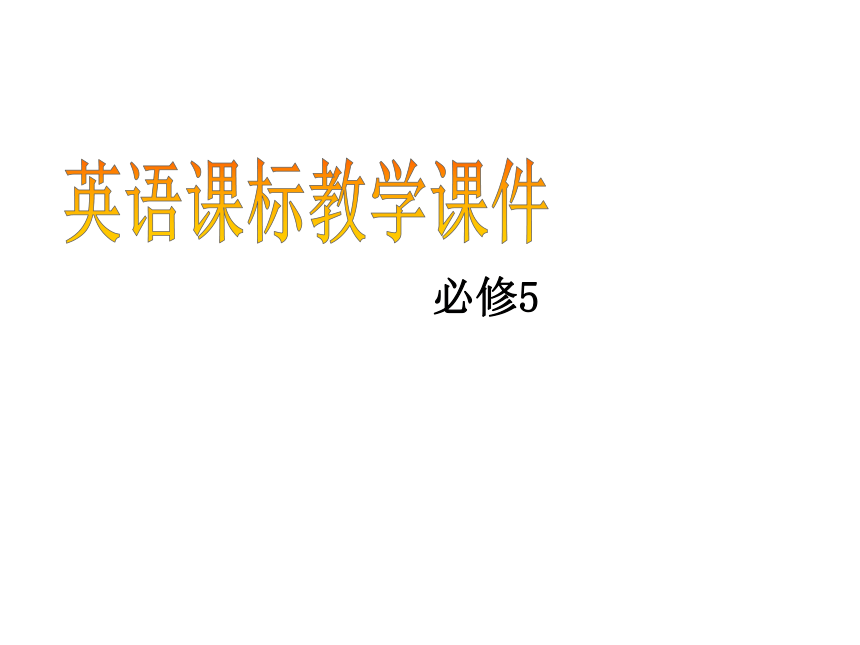
|
|
| 格式 | zip | ||
| 文件大小 | 7.9MB | ||
| 资源类型 | 教案 | ||
| 版本资源 | 人教版(新课程标准) | ||
| 科目 | 英语 | ||
| 更新时间 | 2014-09-10 00:00:00 | ||
图片预览

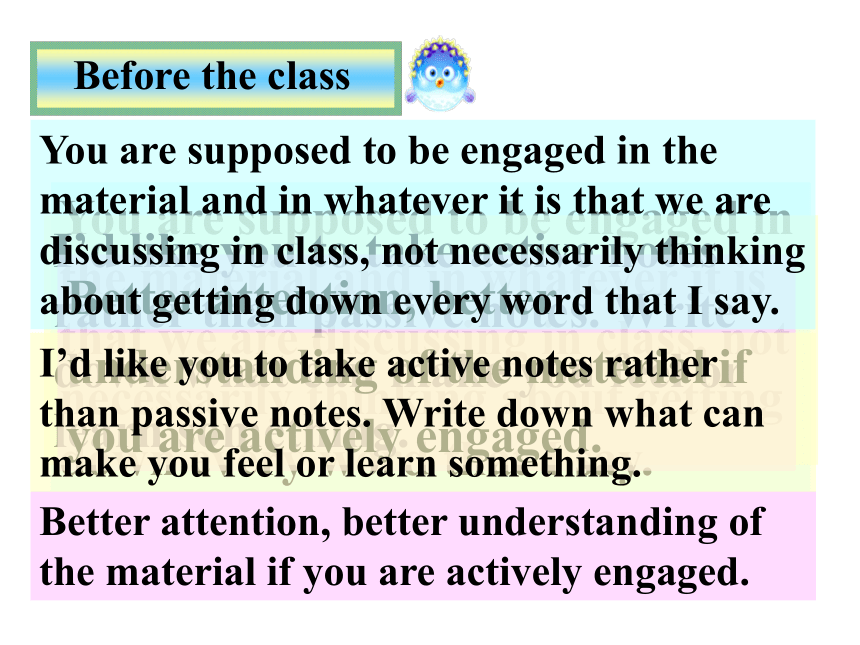
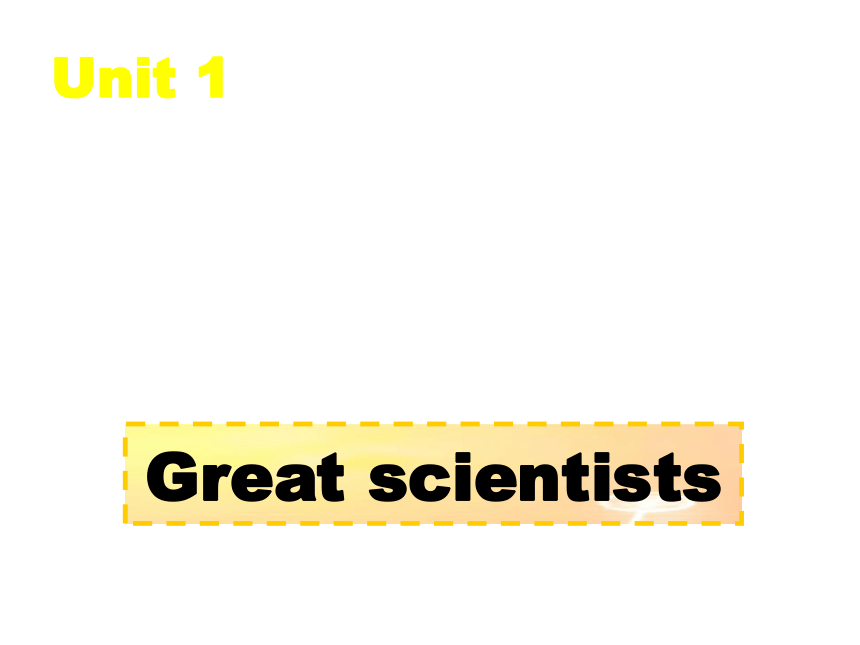
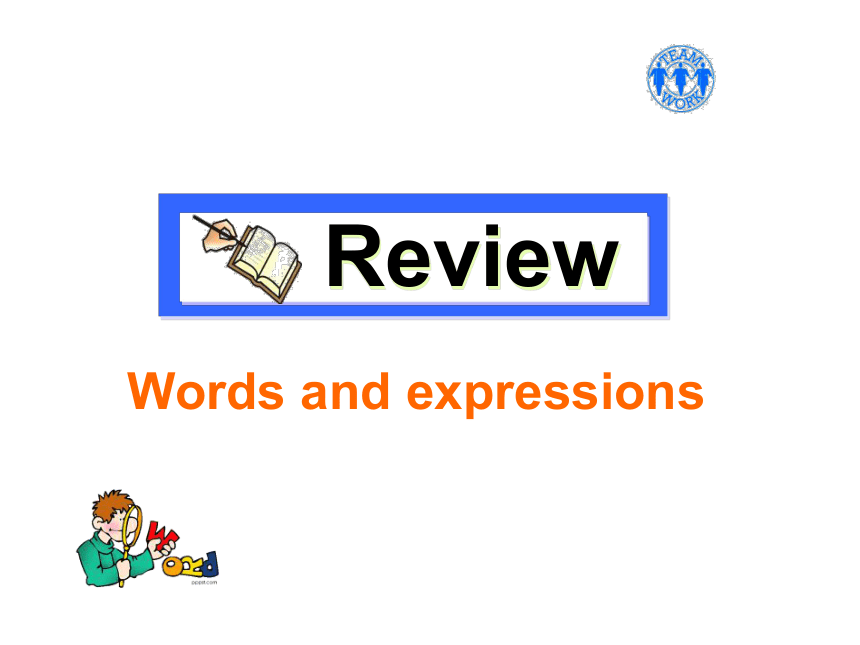
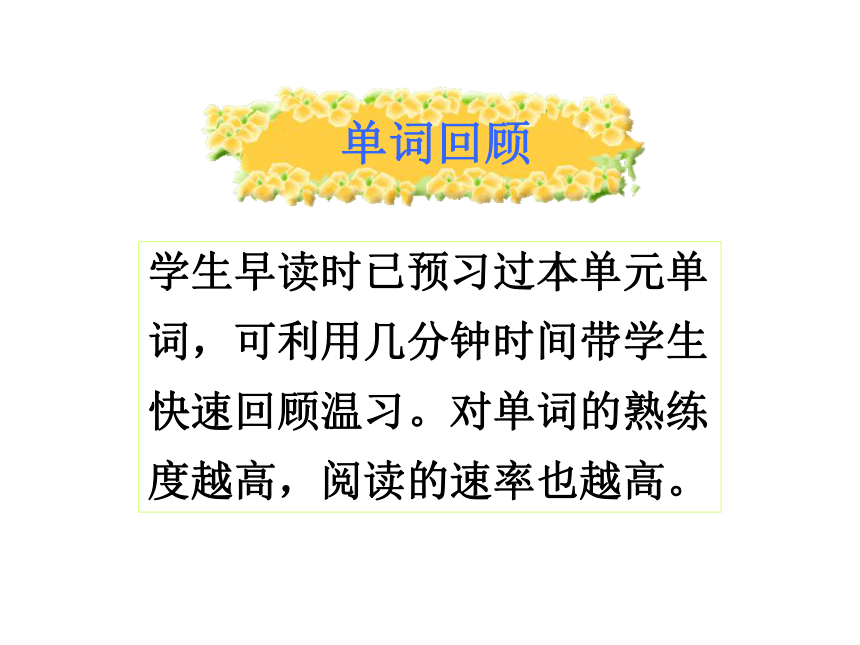
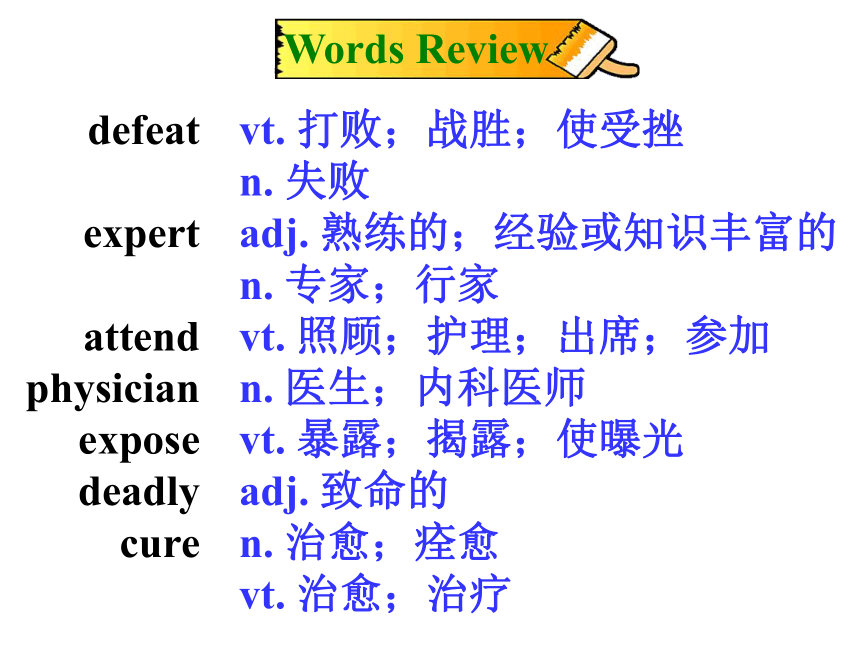
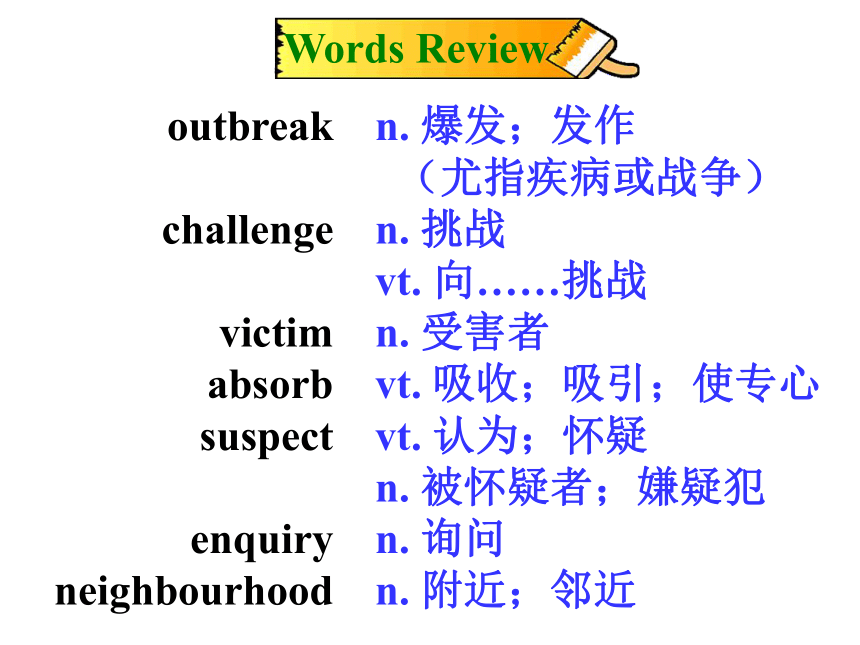
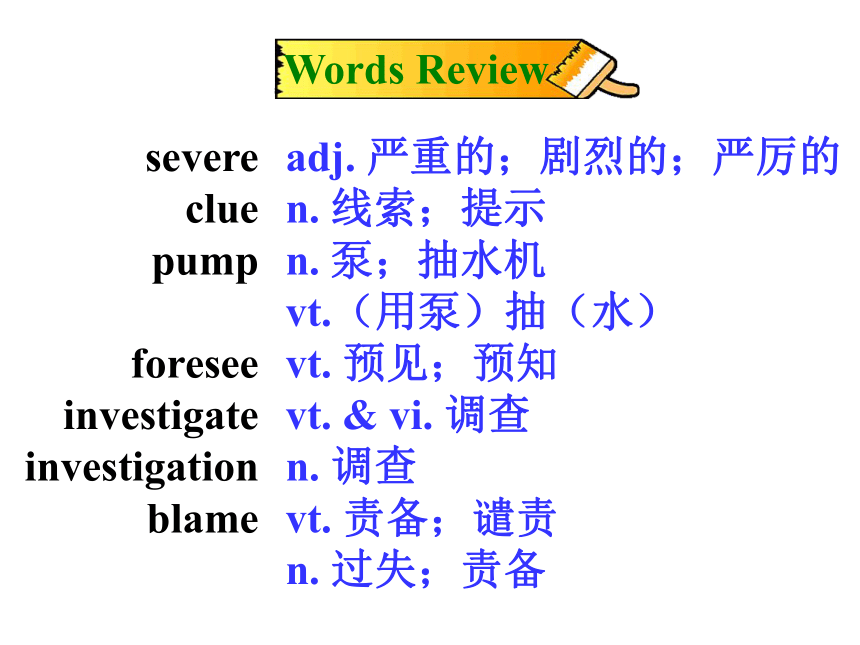
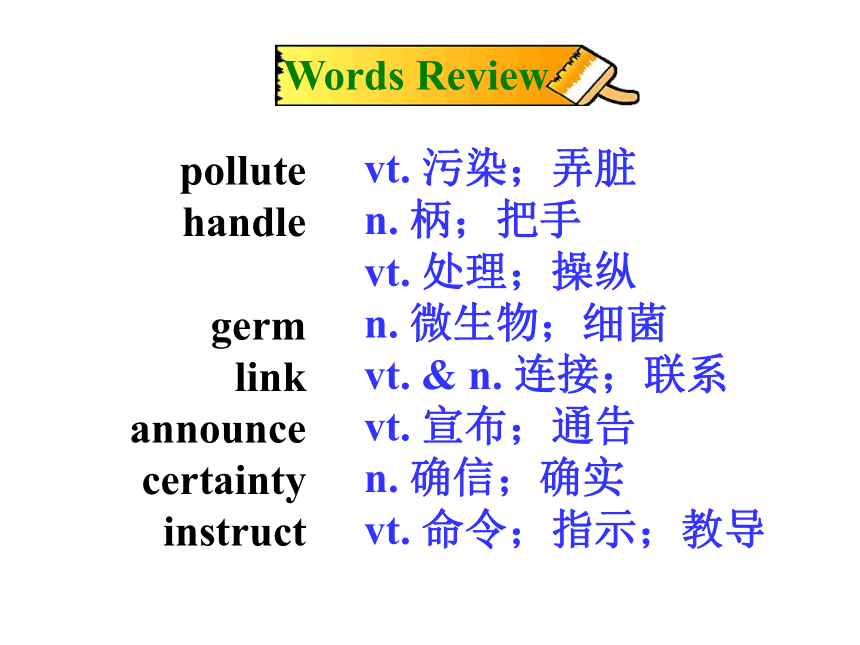

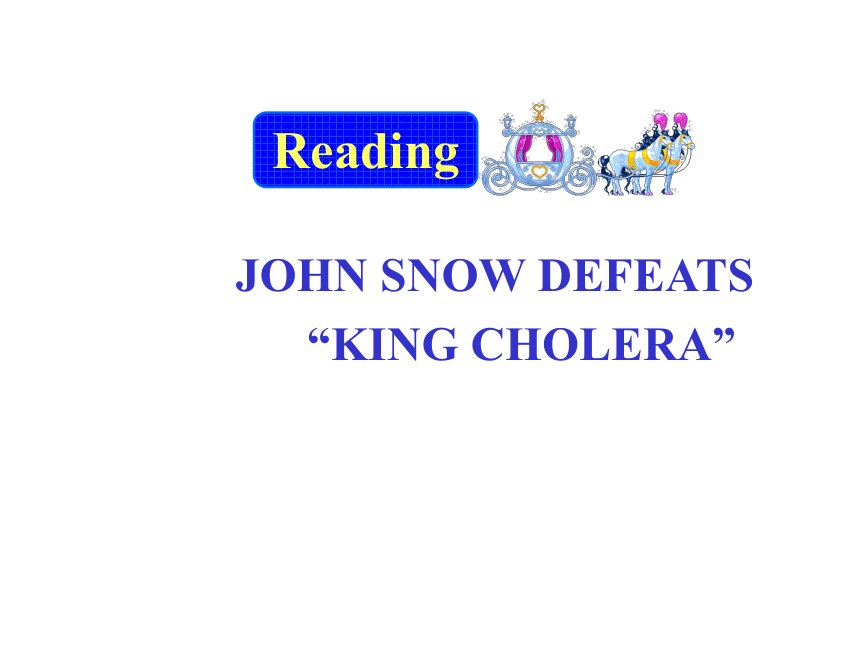
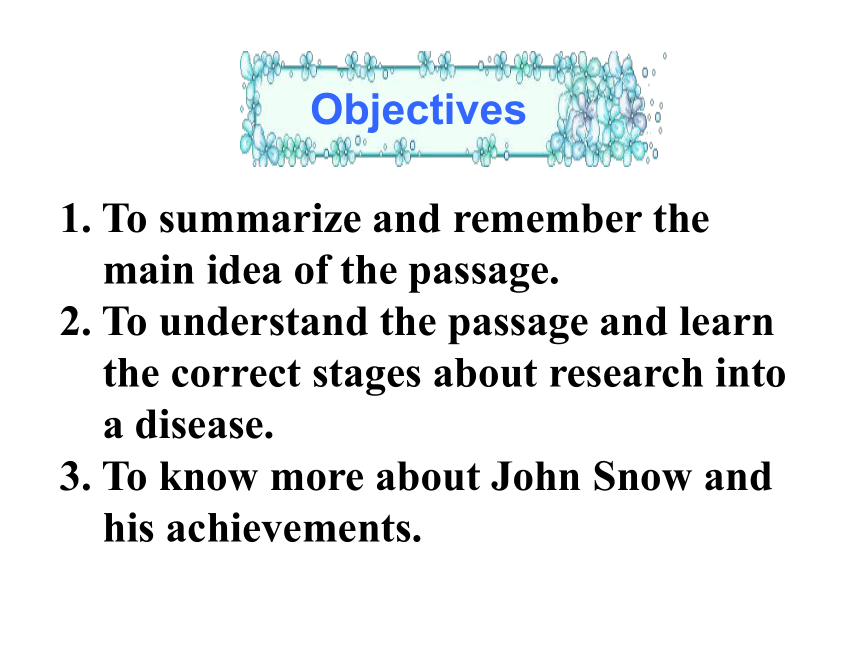
文档简介
课件54张PPT。英语课标教学课件必修5Before the classYou are supposed to be engaged in the material and in whatever it is that we are discussing in class, not necessarily thinking about getting down every word that I say.I’d like you to take active notes rather than passive notes. Write down what can make you feel or learn something.Better attention, better understanding of the material if you are actively engaged.Better attention, better understanding of the material if you are actively engaged.You are supposed to be engaged in the material and in whatever it is that we are discussing in class, not necessarily thinking about getting down every word that I say.I’d like you to take active notes rather than passive notes. Write down what can make you feel or learn something.Great scientists Unit 1ReviewWords and expressions学生早读时已预习过本单元单
词,可利用几分钟时间带学生
快速回顾温习。对单词的熟练
度越高,阅读的速率也越高。Words Reviewdefeat
expert
attend
physician
expose
deadly
curevt. 打败;战胜;使受挫
n. 失败
adj. 熟练的;经验或知识丰富的
n. 专家;行家
vt. 照顾;护理;出席;参加
n. 医生;内科医师
vt. 暴露;揭露;使曝光
adj. 致命的
n. 治愈;痊愈
vt. 治愈;治疗Words Reviewoutbreak
challenge
victim
absorb
suspect
enquiry
neighbourhoodn. 爆发;发作
(尤指疾病或战争)
n. 挑战
vt. 向……挑战
n. 受害者
vt. 吸收;吸引;使专心
vt. 认为;怀疑
n. 被怀疑者;嫌疑犯
n. 询问
n. 附近;邻近Words Reviewsevere
clue
pump
foresee
investigate
investigation
blameadj. 严重的;剧烈的;严厉的
n. 线索;提示
n. 泵;抽水机
vt.(用泵)抽(水)
vt. 预见;预知
vt. & vi. 调查
n. 调查
vt. 责备;谴责
n. 过失;责备Words Reviewpollute
handle
germ
link
announce
certainty
instructvt. 污染;弄脏
n. 柄;把手
vt. 处理;操纵
n. 微生物;细菌
vt. & n. 连接;联系
vt. 宣布;通告
n. 确信;确实
vt. 命令;指示;教导expose … to
link … to …将……和……联系或连接起来
由……组成
使显露; 暴露MatchJOHN SNOW DEFEATS
“KING CHOLERA”1. To summarize and remember the
main idea of the passage.
2. To understand the passage and learn
the correct stages about research into
a disease.
3. To know more about John Snow and
his achievements.Reading Tips阅读时,可根据阅读任务的不同,综合运用略读(skimming)与扫读(scanning)。提高快速阅读水平。Skimming and scanningSkimming and scanning are two fast reading skills to help to browse text and extract the key points.
The skills require practice, but once you have got the hang of them you’ll find you can get through a substantial amount of reading in quite a short time.
These reading methods make it easier for you to grasp large amounts of material, especially when you're previewing. They are also useful when you don't need to know every word. 略读(skimming)只看文章标题、下标题以及每个部分或者段落第一行,关注文章中反复出现的关键词。
略读时,要用充足的时间读懂段落的第一句和第二句,因为第一句往往是该段的主题句(topic sentence),而第二句往往是对前句的延伸(extension)或进一步的解释(explanation)。通过略读把握文章大意运用扫读(scanning)迅速浏览从第三句开始的后面部分,搜寻作者对开头两句的支持句(supporting sentences),并同时注意文章中间是否有转折词(transition),因为这些词常常会把文章的思路逆转或加入其它重要的信息。当读到段落的最后一句时,我们又要使用略读,这时必须再次放慢速度(slow down your pace)直到完全消化作者对段落的小结(conclusion),因为该小结有可能与主题句截然相反或引导读者进入下一个段落。通过扫读寻找特定信息或特定词组Reading strategyskimmingscanninga general
idea certain
informationtitles and headingsthe first and last
sentences of paragraphsthe first and last paragraphspictures and chartsScan the text for
key words and phrases, dates, etc.Do not need to
read the whole
text.Skimming for general ideaAfter reading the passage, match the
following stages with the paragraphs.StagesDraw a conclusion
Think of a method
Collect results
Make a question
Find a problem
Analyze the results
Find supporting evidenceFind a problemMake a questionThink of a methodCollect resultsAnalyse the resultsDraw a conclusionFind supporting evidenceParagraphs & Stages First we should find the problem. Next,
make a question. Then, think of a method.
We should collect as much information as
possible.
Analyzing results is the most
important stage.
Before we make a conclusion, it is
necessary for us to find supporting
evidence.SummaryWhat’s the main idea of the passage?
A. John Snow was a well-known doctor
in London.
B. The cause of cholera was polluted water.
C. The source of all drinking water should
be examined.
D. How John Snow collected, analysed
data and found the cause of the disease
and defeated the disease.John Snow wanted to use his
knowledge to solve cholera.He got interested in two theories.He needed to prove the second
theory was correct.He found out that dirty water was
the cause of cholera.Para. 1Para. 2Para. 3Para. 4Para. 6Para. 7Polluted water carried the virus.Finally “King Cholera” was defeated.Para. 5Cholera was spread by germs and
not in a cloud of gas.Read the passage to find the main idea of each paragraph.Scanning for specific informationRead the passage and number these
events in the order that they happened.___ John Snow began to test two theories.
___ An outbreak of cholera hit London in
1854.
___ John Snow marked the deaths on a
map.
___ He announced that the water carried
the disease.p3 1___ John Snow investigated two streets
where the outbreak was very severe.
___ King Cholera was defeated.
___ He found that most of the deaths were
near a water pump.
___ He had the handle removed from the
water pump.Answer: 2 1 4 7 3 8 5 6 Why couldn’t the cholera be controlled
at first?
A. Its speed of spreading was so fast.
B. Its cause wasn’t understood
C. Its cure wasn’t understood.
D. Both B. & C.Choose the best answer.另附 word 文档链接2. How many people died in 10 days
in two particular streets?
A. Less than 500.
B. More than 500.
C. More than 150.
D. Less than 150.3. What made John Snow find the cause of
cholera?
A. Queen Victoria’s order.
B. His wife’s death.
C. Strong determination, patience and
selfishness.
D. Kindness, carefulness and good
observation.1 John Snow believed Idea 2 was right. How did he finally prove it?John Snow finally proved his idea
because he found an outbreak that was
clearly related to cholera, collected
information and was able to tie cases
outside the area to the polluted water.Answer these questions.p3 22 Do you think John Snow would have
solved this problem without the map?
Give a reason.No. The map helped John Snow organize
his ideas. He was able to identify those
households that had had many deaths
and check their water-drinking habits.
He identified those houses that had had
no deaths and surveyed their drinking
habits. The evidence clearly pointed to
the polluted water being the cause.3 Cholera was a 19th century disease. What disease do you think is similar to cholera today? Why?Three diseases, which are similar today,
are SARS, AIDS and bird flu, because
they are serious, have an unknown
cause and need public health care to
solve them.Careful reading重难点句式分析1. He knew that cholera would never be
controlled until its cause was found.
此句用的是not … until …句型,只不过句子中没有出现not而用的是表示否定意义的词never。宾语从句他知道,在找到病源前,霍乱疫情是无法控制的。时间状语从句Practice1. 我相信他们很快会来。
I believe that they will come soon.
2. 等到你过生日那天再打开它。
Don’t open it until your birthday.
3. 你不放我走,我就一直喊叫。
I won’t stop shouting until you let me go.2. A woman, who had moved away from
Broad Street, liked the water from the
pump so much that she had it delivered to
her house every day. 有一位妇女是从宽街搬过来的,她特别喜欢那里的水,每天都要派人从水泵打水运到家里来。非限制性定语从句结果状语从句定语have sth. done
让别人做某事Practice1. 我们的向导,一个法裔加拿大人,是个
极好的厨师。
Our guide, who was a French Canadian,
was an excellent cook.
2. 她非常诚实,大家都信任她。
She is so honest that everybody trusts
her.
3. I had that door painted last week.
上星期我请人把那扇门漆了。 3. To prevent this from happening again,
John Snow suggested that the source of all
the water supplies be examined. suggest:建议:suggest (that) somebody (should) do…
eg: I?suggest?that?we?(should)?hold?a?meeting?next?week.
He?suggested?a?meeting?be held the next?week. ?为防止这种情况再度发生,约翰·斯诺建议所有水源都要经过检测。宾语从句目的状语to stop (sth.) from happening or existing 阻止,防止Practice1. 我们要防止这种疾病蔓延。
2. 想学好英语,老师建议我们利用一切机会说英语。
3. 我建议我们在作出任何明确而肯定的决定之前先考虑片刻。
4. 我建议这幅画要让专家仔细核验和研究。We should prevent the disease from spreading.
To learn English well, our teacher suggested that we make use of every chance to speak English.
I suggest?(that)?we?wait a while before we make any?firm decisions.
I?suggest?that?it?be?examined?and researched by an expert. Discuss the question in groups. What should you do if you're travelling to a country that has a cholera outbreak? Drink only water that you have boiled.
Other safe drinks include tea or coffee
made with boiled water, bottled
beverages with no ice.Discussion Eat only food that's been thoroughly cooked and is still hot, or fruit that you've peeled yourself.
Avoid undercooked or raw fish and shellfish.
Avoid raw salads and vegetables.
Avoid food and drinks from street vendors. Now two minutes to test your spelling.Spelling Bee1. English-Chinese
expert, physician, victim, enquiry,
neighbourhood, link
2. Chinese-English
打败,照顾,暴露,治愈,向……挑战,
吸收,怀疑,预见,责备,严重的,泵,
污染,处理,宣布,指示 When finished, exchange your papers to see who does the best.John Snow was a well-known ______ in London in the ____ century. He wanted
to find the ______ of cholera in order to ______ it. In 1854 when a cholera ______ out, he began to gather information. He _______ on a map where all the dead people had lived and he found that manydoctor19thcausedefeatbrokemarkedI. Complete the passage with proper words, which will help you retell the text.另附 word 文档链接people who had _______ the dirty water
from the ______ died. So he thought that the polluted water carried the virus. He suggested that the _______ of all the water supplies be _________. The water companies were _________ not to expose people to polluted water any more. Finally, “King Cholera” was defeated.pumpsourceexaminedinstructeddrunkII. Task-based reading.Put the following steps of scientific research in correct order according to the passage. Put forward a hypothesis
Analyze your data and draw a conclusion
Ask a question
Test your hypothesis by doing experiments
Do background research另附 word 文档链接The steps of the scientific research:
1. _______________________________→
2. _______________________________→
3. _______________________________→
4. _______________________________
_______________________________→
5. _______________________________
_______________________________ Ask a questionDo background research Put forward a hypothesisTest your hypothesis by doing experiments Analyze your data and draw a conclusion Self-assessmentThink about what we’ve just learnt today.Time for Reflection Study without reflection is a waste of time.Think in English After the classIt’s time to stop the class for us to look back in silence.Find more information about John Snow and cholera. expert, physician, absorb, enquiry, severe, foresee, pollute, link … to …, announce, instruct.2. 发挥想象,连词成文(50-100字)。Homework3. Read the articles in page 1 of Learning
English. The more you read, the faster
and better you’ll understand. When
finished reading, write a summary in
100 words or so.
4. Recite the last two paragraphs.
5. Read the following passage and copy
it into your notebook. Pay attention
to the coloured words.Here is an astonishing and significant fact: Mental work alone can’t make us tired. It sounds absurd. But a few years ago, scientists tried to find out how long the human brain could labor without reaching a stage of fatigue (疲劳).To the amazement of these scientists, they discovered that blood passing through the brain, when it is active, shows no fatigue at all! If we took a drop of blood from a day laborer, we would find it full of fatigue toxins (毒素) and fatigue products. But if we took blood from the brain of an Albert Einstein, it would show no fatigue toxins at the end of the day.
So far as the brain is concerned, it can work as well and swiftly at the end of eight or even twelve hours of effort as at the beginning. The brain is totally tireless. So what makes us tired? Some scientists declare that most of our fatigue comes from our mental and emotional (情感的) attitudes. One of England’s most outstanding scientists, J. A. Hadfield, says, “The greater part of the fatigue from which we suffer is of mental origin. In fact, fatigue of purely physical origin is rare.” Dr. Brill, a famous American scientist, goes even further. He declares, “One hundred percent of the fatigue of a sitting worker in good health is due to emotional problems.”
What kinds of emotions make sitting workers tired? Joy? Satisfaction? No! A feeling of being bored, anger, anxiety, tenseness, worry, a feeling of not being appreciated - those are the emotions that tire sitting workers. Hard work by itself seldom causes fatigue. We get tired because our emotions produce nervousness in the body.
词,可利用几分钟时间带学生
快速回顾温习。对单词的熟练
度越高,阅读的速率也越高。Words Reviewdefeat
expert
attend
physician
expose
deadly
curevt. 打败;战胜;使受挫
n. 失败
adj. 熟练的;经验或知识丰富的
n. 专家;行家
vt. 照顾;护理;出席;参加
n. 医生;内科医师
vt. 暴露;揭露;使曝光
adj. 致命的
n. 治愈;痊愈
vt. 治愈;治疗Words Reviewoutbreak
challenge
victim
absorb
suspect
enquiry
neighbourhoodn. 爆发;发作
(尤指疾病或战争)
n. 挑战
vt. 向……挑战
n. 受害者
vt. 吸收;吸引;使专心
vt. 认为;怀疑
n. 被怀疑者;嫌疑犯
n. 询问
n. 附近;邻近Words Reviewsevere
clue
pump
foresee
investigate
investigation
blameadj. 严重的;剧烈的;严厉的
n. 线索;提示
n. 泵;抽水机
vt.(用泵)抽(水)
vt. 预见;预知
vt. & vi. 调查
n. 调查
vt. 责备;谴责
n. 过失;责备Words Reviewpollute
handle
germ
link
announce
certainty
instructvt. 污染;弄脏
n. 柄;把手
vt. 处理;操纵
n. 微生物;细菌
vt. & n. 连接;联系
vt. 宣布;通告
n. 确信;确实
vt. 命令;指示;教导expose … to
link … to …将……和……联系或连接起来
由……组成
使显露; 暴露MatchJOHN SNOW DEFEATS
“KING CHOLERA”1. To summarize and remember the
main idea of the passage.
2. To understand the passage and learn
the correct stages about research into
a disease.
3. To know more about John Snow and
his achievements.Reading Tips阅读时,可根据阅读任务的不同,综合运用略读(skimming)与扫读(scanning)。提高快速阅读水平。Skimming and scanningSkimming and scanning are two fast reading skills to help to browse text and extract the key points.
The skills require practice, but once you have got the hang of them you’ll find you can get through a substantial amount of reading in quite a short time.
These reading methods make it easier for you to grasp large amounts of material, especially when you're previewing. They are also useful when you don't need to know every word. 略读(skimming)只看文章标题、下标题以及每个部分或者段落第一行,关注文章中反复出现的关键词。
略读时,要用充足的时间读懂段落的第一句和第二句,因为第一句往往是该段的主题句(topic sentence),而第二句往往是对前句的延伸(extension)或进一步的解释(explanation)。通过略读把握文章大意运用扫读(scanning)迅速浏览从第三句开始的后面部分,搜寻作者对开头两句的支持句(supporting sentences),并同时注意文章中间是否有转折词(transition),因为这些词常常会把文章的思路逆转或加入其它重要的信息。当读到段落的最后一句时,我们又要使用略读,这时必须再次放慢速度(slow down your pace)直到完全消化作者对段落的小结(conclusion),因为该小结有可能与主题句截然相反或引导读者进入下一个段落。通过扫读寻找特定信息或特定词组Reading strategyskimmingscanninga general
idea certain
informationtitles and headingsthe first and last
sentences of paragraphsthe first and last paragraphspictures and chartsScan the text for
key words and phrases, dates, etc.Do not need to
read the whole
text.Skimming for general ideaAfter reading the passage, match the
following stages with the paragraphs.StagesDraw a conclusion
Think of a method
Collect results
Make a question
Find a problem
Analyze the results
Find supporting evidenceFind a problemMake a questionThink of a methodCollect resultsAnalyse the resultsDraw a conclusionFind supporting evidenceParagraphs & Stages First we should find the problem. Next,
make a question. Then, think of a method.
We should collect as much information as
possible.
Analyzing results is the most
important stage.
Before we make a conclusion, it is
necessary for us to find supporting
evidence.SummaryWhat’s the main idea of the passage?
A. John Snow was a well-known doctor
in London.
B. The cause of cholera was polluted water.
C. The source of all drinking water should
be examined.
D. How John Snow collected, analysed
data and found the cause of the disease
and defeated the disease.John Snow wanted to use his
knowledge to solve cholera.He got interested in two theories.He needed to prove the second
theory was correct.He found out that dirty water was
the cause of cholera.Para. 1Para. 2Para. 3Para. 4Para. 6Para. 7Polluted water carried the virus.Finally “King Cholera” was defeated.Para. 5Cholera was spread by germs and
not in a cloud of gas.Read the passage to find the main idea of each paragraph.Scanning for specific informationRead the passage and number these
events in the order that they happened.___ John Snow began to test two theories.
___ An outbreak of cholera hit London in
1854.
___ John Snow marked the deaths on a
map.
___ He announced that the water carried
the disease.p3 1___ John Snow investigated two streets
where the outbreak was very severe.
___ King Cholera was defeated.
___ He found that most of the deaths were
near a water pump.
___ He had the handle removed from the
water pump.Answer: 2 1 4 7 3 8 5 6 Why couldn’t the cholera be controlled
at first?
A. Its speed of spreading was so fast.
B. Its cause wasn’t understood
C. Its cure wasn’t understood.
D. Both B. & C.Choose the best answer.另附 word 文档链接2. How many people died in 10 days
in two particular streets?
A. Less than 500.
B. More than 500.
C. More than 150.
D. Less than 150.3. What made John Snow find the cause of
cholera?
A. Queen Victoria’s order.
B. His wife’s death.
C. Strong determination, patience and
selfishness.
D. Kindness, carefulness and good
observation.1 John Snow believed Idea 2 was right. How did he finally prove it?John Snow finally proved his idea
because he found an outbreak that was
clearly related to cholera, collected
information and was able to tie cases
outside the area to the polluted water.Answer these questions.p3 22 Do you think John Snow would have
solved this problem without the map?
Give a reason.No. The map helped John Snow organize
his ideas. He was able to identify those
households that had had many deaths
and check their water-drinking habits.
He identified those houses that had had
no deaths and surveyed their drinking
habits. The evidence clearly pointed to
the polluted water being the cause.3 Cholera was a 19th century disease. What disease do you think is similar to cholera today? Why?Three diseases, which are similar today,
are SARS, AIDS and bird flu, because
they are serious, have an unknown
cause and need public health care to
solve them.Careful reading重难点句式分析1. He knew that cholera would never be
controlled until its cause was found.
此句用的是not … until …句型,只不过句子中没有出现not而用的是表示否定意义的词never。宾语从句他知道,在找到病源前,霍乱疫情是无法控制的。时间状语从句Practice1. 我相信他们很快会来。
I believe that they will come soon.
2. 等到你过生日那天再打开它。
Don’t open it until your birthday.
3. 你不放我走,我就一直喊叫。
I won’t stop shouting until you let me go.2. A woman, who had moved away from
Broad Street, liked the water from the
pump so much that she had it delivered to
her house every day. 有一位妇女是从宽街搬过来的,她特别喜欢那里的水,每天都要派人从水泵打水运到家里来。非限制性定语从句结果状语从句定语have sth. done
让别人做某事Practice1. 我们的向导,一个法裔加拿大人,是个
极好的厨师。
Our guide, who was a French Canadian,
was an excellent cook.
2. 她非常诚实,大家都信任她。
She is so honest that everybody trusts
her.
3. I had that door painted last week.
上星期我请人把那扇门漆了。 3. To prevent this from happening again,
John Snow suggested that the source of all
the water supplies be examined. suggest:建议:suggest (that) somebody (should) do…
eg: I?suggest?that?we?(should)?hold?a?meeting?next?week.
He?suggested?a?meeting?be held the next?week. ?为防止这种情况再度发生,约翰·斯诺建议所有水源都要经过检测。宾语从句目的状语to stop (sth.) from happening or existing 阻止,防止Practice1. 我们要防止这种疾病蔓延。
2. 想学好英语,老师建议我们利用一切机会说英语。
3. 我建议我们在作出任何明确而肯定的决定之前先考虑片刻。
4. 我建议这幅画要让专家仔细核验和研究。We should prevent the disease from spreading.
To learn English well, our teacher suggested that we make use of every chance to speak English.
I suggest?(that)?we?wait a while before we make any?firm decisions.
I?suggest?that?it?be?examined?and researched by an expert. Discuss the question in groups. What should you do if you're travelling to a country that has a cholera outbreak? Drink only water that you have boiled.
Other safe drinks include tea or coffee
made with boiled water, bottled
beverages with no ice.Discussion Eat only food that's been thoroughly cooked and is still hot, or fruit that you've peeled yourself.
Avoid undercooked or raw fish and shellfish.
Avoid raw salads and vegetables.
Avoid food and drinks from street vendors. Now two minutes to test your spelling.Spelling Bee1. English-Chinese
expert, physician, victim, enquiry,
neighbourhood, link
2. Chinese-English
打败,照顾,暴露,治愈,向……挑战,
吸收,怀疑,预见,责备,严重的,泵,
污染,处理,宣布,指示 When finished, exchange your papers to see who does the best.John Snow was a well-known ______ in London in the ____ century. He wanted
to find the ______ of cholera in order to ______ it. In 1854 when a cholera ______ out, he began to gather information. He _______ on a map where all the dead people had lived and he found that manydoctor19thcausedefeatbrokemarkedI. Complete the passage with proper words, which will help you retell the text.另附 word 文档链接people who had _______ the dirty water
from the ______ died. So he thought that the polluted water carried the virus. He suggested that the _______ of all the water supplies be _________. The water companies were _________ not to expose people to polluted water any more. Finally, “King Cholera” was defeated.pumpsourceexaminedinstructeddrunkII. Task-based reading.Put the following steps of scientific research in correct order according to the passage. Put forward a hypothesis
Analyze your data and draw a conclusion
Ask a question
Test your hypothesis by doing experiments
Do background research另附 word 文档链接The steps of the scientific research:
1. _______________________________→
2. _______________________________→
3. _______________________________→
4. _______________________________
_______________________________→
5. _______________________________
_______________________________ Ask a questionDo background research Put forward a hypothesisTest your hypothesis by doing experiments Analyze your data and draw a conclusion Self-assessmentThink about what we’ve just learnt today.Time for Reflection Study without reflection is a waste of time.Think in English After the classIt’s time to stop the class for us to look back in silence.Find more information about John Snow and cholera. expert, physician, absorb, enquiry, severe, foresee, pollute, link … to …, announce, instruct.2. 发挥想象,连词成文(50-100字)。Homework3. Read the articles in page 1 of Learning
English. The more you read, the faster
and better you’ll understand. When
finished reading, write a summary in
100 words or so.
4. Recite the last two paragraphs.
5. Read the following passage and copy
it into your notebook. Pay attention
to the coloured words.Here is an astonishing and significant fact: Mental work alone can’t make us tired. It sounds absurd. But a few years ago, scientists tried to find out how long the human brain could labor without reaching a stage of fatigue (疲劳).To the amazement of these scientists, they discovered that blood passing through the brain, when it is active, shows no fatigue at all! If we took a drop of blood from a day laborer, we would find it full of fatigue toxins (毒素) and fatigue products. But if we took blood from the brain of an Albert Einstein, it would show no fatigue toxins at the end of the day.
So far as the brain is concerned, it can work as well and swiftly at the end of eight or even twelve hours of effort as at the beginning. The brain is totally tireless. So what makes us tired? Some scientists declare that most of our fatigue comes from our mental and emotional (情感的) attitudes. One of England’s most outstanding scientists, J. A. Hadfield, says, “The greater part of the fatigue from which we suffer is of mental origin. In fact, fatigue of purely physical origin is rare.” Dr. Brill, a famous American scientist, goes even further. He declares, “One hundred percent of the fatigue of a sitting worker in good health is due to emotional problems.”
What kinds of emotions make sitting workers tired? Joy? Satisfaction? No! A feeling of being bored, anger, anxiety, tenseness, worry, a feeling of not being appreciated - those are the emotions that tire sitting workers. Hard work by itself seldom causes fatigue. We get tired because our emotions produce nervousness in the body.
